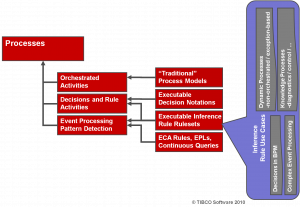Forrester (and prior to that, long-time independent) BPM consultant Derek Miers often extolled the virtues of “case management” over “generic BPM” (and it was often commented that TIBCO BPM technologies were well regarded in this area). Yet until recently there seemed to be not much going on in the case management space except for the appearance of a few specialist case management vendors.
Then TIBCO and Cordys presented back in 2008 on “Dynamic Business Activity Modelling” that led indirectly to the current OMG RFP work on the “BPM superset” called “Case Management”. The pertinent TIBCO technologies we presented, over and above conventional BPM, were Conductor (goal-driven processes), CEP (rule and event-based processes), and combinations thereof (goals, rules, CEP, processes) such as in TIBCO AFF. Subsequently it seems that there has been a veritable explosion in interest around case management: for example, Fujitsu’s Keith Senson (chair of the WfMC) has published an acclaimed book on what he and WfMC are calling Adaptive Case Management. Per WfMC and the very popular LinkedIn discussion board on this, the area also covers the idea of social collaborations in “process” development and execution (another hot topic, per advocates such as Sandy Kemsley).

At the OMG meeting last week I discussed the nascent OASIS SAF framework with CA’s Paul Lipton, and its possible role in providing a standardised collaborative (a.k.a. “social) community framework for suggesting / organising / developing solutions (a.k.a. “processes”) to problems (e.g. business goals and issues – see BMM) … we will cover more on this idea later. Meanwhile, I offer the interesting observation that (1) SAF is based on the ideas of medical practices (symptoms, prescriptions, etc), and (2) case management’s widest use is probably healthcare (e.g. see the Wikipedia reference). Coincidence?
From the CEP perspective, I presented at OMG and SemTech this week the idea that business processes are just ways of organising events, decisions and actions, and that capabilities like Operational Intelligence are just advanced business processes – and are dynamic and “case oriented” too in many scenarios…





